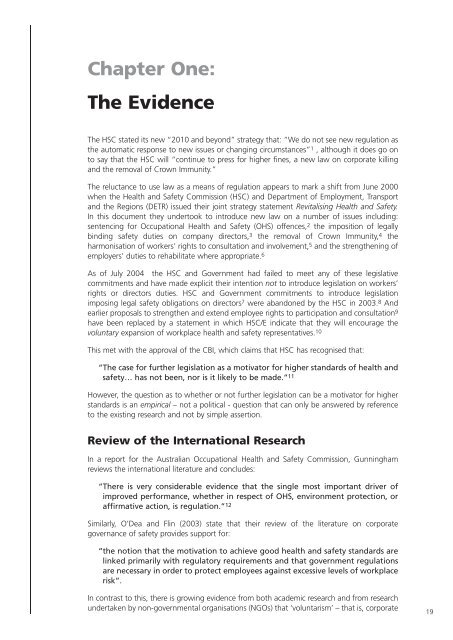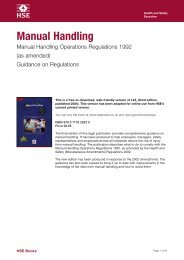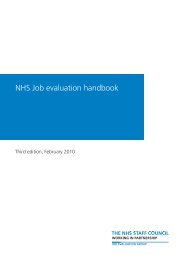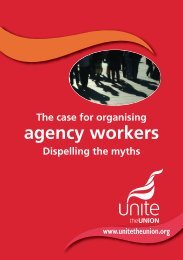Making Companies Safe - what works? (CCA ... - Unite the Union
Making Companies Safe - what works? (CCA ... - Unite the Union
Making Companies Safe - what works? (CCA ... - Unite the Union
Create successful ePaper yourself
Turn your PDF publications into a flip-book with our unique Google optimized e-Paper software.
Chapter One:<br />
The Evidence<br />
The HSC stated its new “2010 and beyond” strategy that: “We do not see new regulation as<br />
<strong>the</strong> automatic response to new issues or changing circumstances” 1 , although it does go on<br />
to say that <strong>the</strong> HSC will “continue to press for higher fines, a new law on corporate killing<br />
and <strong>the</strong> removal of Crown Immunity.”<br />
The reluctance to use law as a means of regulation appears to mark a shift from June 2000<br />
when <strong>the</strong> Health and <strong>Safe</strong>ty Commission (HSC) and Department of Employment, Transport<br />
and <strong>the</strong> Regions (DETR) issued <strong>the</strong>ir joint strategy statement Revitalising Health and <strong>Safe</strong>ty.<br />
In this document <strong>the</strong>y undertook to introduce new law on a number of issues including:<br />
sentencing for Occupational Health and <strong>Safe</strong>ty (OHS) offences, 2 <strong>the</strong> imposition of legally<br />
binding safety duties on company directors, 3 <strong>the</strong> removal of Crown Immunity, 4 <strong>the</strong><br />
harmonisation of workers’ rights to consultation and involvement, 5 and <strong>the</strong> streng<strong>the</strong>ning of<br />
employers’ duties to rehabilitate where appropriate. 6<br />
As of July 2004 <strong>the</strong> HSC and Government had failed to meet any of <strong>the</strong>se legislative<br />
commitments and have made explicit <strong>the</strong>ir intention not to introduce legislation on workers’<br />
rights or directors duties. HSC and Government commitments to introduce legislation<br />
imposing legal safety obligations on directors 7 were abandoned by <strong>the</strong> HSC in 2003. 8 And<br />
earlier proposals to streng<strong>the</strong>n and extend employee rights to participation and consultation 9<br />
have been replaced by a statement in which HSC/E indicate that <strong>the</strong>y will encourage <strong>the</strong><br />
voluntary expansion of workplace health and safety representatives. 10<br />
This met with <strong>the</strong> approval of <strong>the</strong> CBI, which claims that HSC has recognised that:<br />
“The case for fur<strong>the</strong>r legislation as a motivator for higher standards of health and<br />
safety… has not been, nor is it likely to be made.” 11<br />
However, <strong>the</strong> question as to whe<strong>the</strong>r or not fur<strong>the</strong>r legislation can be a motivator for higher<br />
standards is an empirical – not a political - question that can only be answered by reference<br />
to <strong>the</strong> existing research and not by simple assertion.<br />
Review of <strong>the</strong> International Research<br />
In a report for <strong>the</strong> Australian Occupational Health and <strong>Safe</strong>ty Commission, Gunningham<br />
reviews <strong>the</strong> international literature and concludes:<br />
“There is very considerable evidence that <strong>the</strong> single most important driver of<br />
improved performance, whe<strong>the</strong>r in respect of OHS, environment protection, or<br />
affirmative action, is regulation.” 12<br />
Similarly, O’Dea and Flin (2003) state that <strong>the</strong>ir review of <strong>the</strong> literature on corporate<br />
governance of safety provides support for:<br />
“<strong>the</strong> notion that <strong>the</strong> motivation to achieve good health and safety standards are<br />
linked primarily with regulatory requirements and that government regulations<br />
are necessary in order to protect employees against excessive levels of workplace<br />
risk”.<br />
In contrast to this, <strong>the</strong>re is growing evidence from both academic research and from research<br />
undertaken by non-governmental organisations (NGOs) that ‘voluntarism’ – that is, corporate<br />
19
















